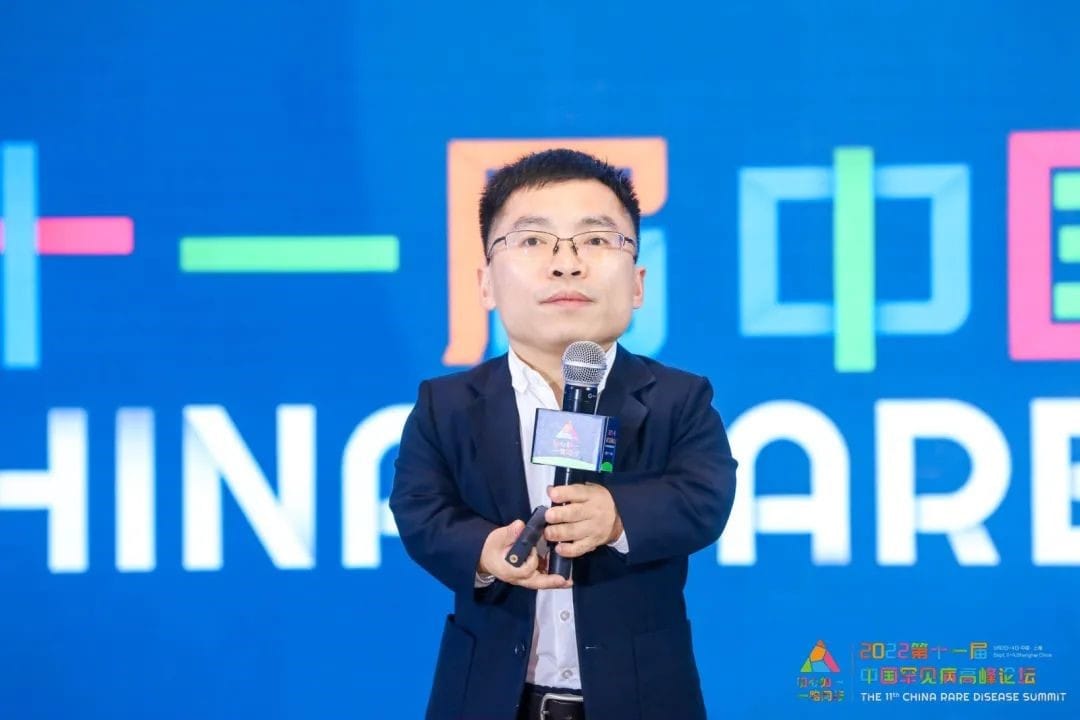Chinese Organization for Rare Disorders Founder Kevin Huang: China is Focusing on Solving Orphan Drug Access Issues

On a beautiful Wednesday morning, just after celebrating July 4th, I sat down with Kevin Huang, the visionary founder of the Chinese Organization for Rare Disorders (CORD), for a Zoom chat. As a rare disease patient himself, Kevin exuded a remarkable blend of candor, passion, and a balanced worldview.
On the call, we delved into a range of topics, including the eagerly anticipated release of the second batch of the rare disease list, the intricate balance between basic medical insurance’s (BMI) principle of insuring the basics, and the unique needs of rare disease patients. We also explored how CORD played a pivotal role in facilitating Shire/Takeda's successful launch of the first drug for hereditary angioedema (HAE) in China. Last, but not least, we got a sneak peek into the upcoming China Rare Disease Summit, scheduled to take place in Changsha this September.

CORD founder Kevin Huang at the 2022 11th China Rare Disease Summit. The Summit attracts thousands of participants each year and is the largest of its kind in China.
2nd Edition of China's List of Rare Diseases
Kelly: As a "working definition" of rare diseases in China, China's First List of Rare Diseases has had a substantial impact on policy priorities and has contributed to significant advancements in key areas. The "Procedures for the Formulation of Rare Disease Catalog" requires that the catalog be updated at least once every two years. It has been five years since the first batch of the rare disease catalog was released. You asked this question at the 11th China Rare Disease Summit: “When will the second batch of rare disease catalog be released?” Do you have an update on this? What do you think are the main reasons for the delay?
Kevin: Well, that's a very good question and a concern shared by many. First of all, there is some good news. The second batch of the catalog is reportedly in its final stage of development. So, it is likely to be released this year.
Indeed, as you mentioned, the entire industry has been eagerly anticipating the release of China's second batch of rare disease catalog over the past five years, but it hasn't been released yet. So, every year, we have been asking for it. One important reason for this delay may be the pandemic because China's response to the pandemic has been different from that of developed countries around the world in the past three years. The Chinese government has taken a more proactive and aggressive defensive measure. Consequently, the attention and focus of the government on public health and related affairs may have been directed toward epidemic prevention.
China Health Authority’s New Approach: Do What We Can, and Do Our Best
Kelly: China's medical insurance covers the basics. National reimbursement negotiations are based on price volume trade-offs. This poses significant challenges to market access for high-value, innovative orphan drugs. As the founder of one of China's most influential rare disease organizations, what is your stance on BMI’s “insuring the basics” principle? Do you think it is realistic to expect a higher pricing threshold to be applied to high-value orphan drugs during national negotiations?
Kevin: Here is my general understanding. China is a large country with uneven levels of economic and medical development across provinces and cities. Overall, China implements a social insurance system, so it mainly relies on the government, which is very different from the US and somewhat similar to Europe. In Europe, countries like Germany and France also rely on government guarantees.
Although China experienced a long period of rapid economic growth, from a per capita perspective, it is still relatively low (GDP-wise). There is a considerable difference in per capita GDP between China, European Countries, and the US. So, for a long time in the past, the focus was on basic coverage, as you mentioned earlier.
"Basic coverage" means everyone has a little, but not much. However, in reality, such medical security policies cannot solve the problems of those with major illnesses. If you have a minor illness, the government will reimburse you a little, but when someone truly faces a serious or major illness and requires imported drugs or medical services, it becomes a significant challenge.
Rare diseases and orphan drugs are extremely expensive, so how does the Chinese government address them?
There are some new changes. One of these changes comes from a new perspective from the government. Yes, although we still talk about the basics, the government now emphasizes an important concept: "Do what we can, and do our best." "Do what we can" means we do what we are capable of, and "Do our best" means we put in our utmost efforts. So, in practice, we have seen the Chinese government making a lot of efforts in terms of doing what they can and doing their best. For example, in the past few years, we have seen very good guarantee mechanisms for cancer patients in China, and it is getting better and better. The amount of reimbursement for many cancer medications is very high. So, the government does not simply end with this so-called basic medical insurance. In fact, they are exploring (coverage solutions for) major and severe illnesses.
Additionally, China's medical security adopts a multi-tiered system. It combines multiple insurance systems together. Just as you mentioned earlier, there is a basic component, which is the essential drug list included in medical insurance. Then there is medical assistance, which provides assistance for major illnesses and medical expenses. Now, there are annual negotiations and centralized procurement of high-value and innovative drugs by the country. Overall, these policies are in line with the overall situation in China.
Considering the enormous medical needs of such a large country (the deployment of a multi-tiered system) has its objective reasons; otherwise, it wouldn't be done this way. If the system were ineffective, it would collapse, but it hasn't collapsed. So, China's experimentation (with the multi-tiered system) in many aspects, despite the issues, can provide a medical security solution for China’s enormous population. (This solution) may not be the same (as those deployed) for (countries with) populations of tens of millions or hundreds of millions. That's the first part I want to explain.
The second part concerns rare diseases.
In the past few years, the government has undoubtedly done a lot in this regard. We can see that in the past decade, China has experimented with many new payment mechanisms for orphan drugs. However, overall, in terms of meeting the needs of rare disease patients, it is undoubtedly far from enough.
But you ask if the Chinese government is doing something about it. Yes, they are doing a lot. Are they trying? Yes, they are trying. Are they taking action? Yes, they are taking action. Is rare disease a policy priority? It absolutely is. Apart from cancer, rare diseases are now the most important healthcare issue in China. The focus is on solving the problem of access to orphan drugs, and this has received significant attention from various government departments. This is undoubtedly the case. But the depth and breadth of the solutions still need improvement, given there are so many different rare diseases and drugs.
As you may know, in Europe and the US, there are increasingly more new innovative drugs and gene therapies, and they are becoming more expensive. These drugs have not yet entered China, and even if they do, it is challenging to have them covered at such high prices.
Overall, China's national healthcare security system faces significant challenges. There is no doubt about it. We still have quite a bit of catching up to do.
Case Study: CORD and Takeda Collaboration
Kelly: From driving orphan drug R&D to shaping coverage and reimbursement policies, the collaboration between pharmaceutical companies and rare disease patient organizations is crucial. CORD has been established for ten years. During this period, what are some of the most successful examples of collaboration between CORD and pharmaceutical companies? What do you think are the key factors behind these successful collaborations?
Kevin: Indeed, we have collaborated with many pharmaceutical companies, especially those with marketed products for rare diseases. Our collaborations cover several aspects. One aspect is related to clinical research, as you mentioned earlier, such as early-stage drug research, pre-registration clinical studies, as well as access facilitation, patient education, and advocacy for coverage and reimbursement.
In terms of specific cases, we have had many collaborations with pharmaceutical companies over the past decade. Let me give you an example. Currently, one of the largest rare disease companies in the world is Takeda. Takeda wasn't initially focused on rare diseases, but after acquiring Shire, it became one of the largest rare disease companies globally. So, our collaboration dates back from working with Shire to collaborating with Takeda, and it has been a continuous process.
Shire initially brought a product specifically for the treatment of patients with HAE to China. This drug had been on the market in Europe and the United States for quite some time but wasn't introduced to China until 2017-2018. They had decided to bring this innovative product to serve patients in China. However, at that time, there were no (known) patients with HAE, and there was limited awareness about HAE among doctors and the general society. The disease was often misdiagnosed.
Therefore, in 2017, we initiated a project specifically to incubate a community of HAE patients. It was crucial to connect all these patients, to unite them. Through these efforts, we started by identifying patients and finding doctors to establish patient-physician education. After the drug was launched, we advocated for its inclusion in basic medical insurance. Currently, both drugs for the treatment of HAE are included in the national medical insurance list, which is very important. From the perspective of patients, the entire process, from having no drugs available to having affordable medications covered by insurance, has been the result of our continuous efforts.
The key point in this process is the collaboration with pharmaceutical companies. Without the products from these companies, we wouldn't have paid attention to these patient groups. At CORD, we focus on many disease groups but have priorities. Our priority is given to diseases for which there are already existing treatments. This undoubtedly becomes the focal point of our work.
Of course, our work is not limited to disease groups with available drugs. We also support other groups that don't have existing treatments, providing various services. However, disease groups with existing treatments are given priority because our efforts to assist them become much more impactful.
The Upcoming 12th Rare Disease Summit in Changsha
Kelly: The 12th China Rare Disease Summit hosted by CORD will open in Changsha in September. It is an annual event and the largest gathering in the field of rare diseases in China. For those decision-makers from European and US pharmaceutical companies who have not attended the summit before, why should they go to Changsha this year?
Kevin: If I have to give reasons, two points. First, our CORD summit is the best and most important platform to understand the entire rare disease industry in China. If foreign pharmaceutical companies or experts want to understand the development of rare diseases in China, as well as to enter the Chinese market and are looking for a conference or an opportunity, our summit is undoubtedly the best choice.
The second reason is that due to the current geopolitical climate, China is increasingly being viewed and understood in a one-sided manner, with many misconceptions. It has led to unfair views, attitudes, and behaviors toward China. However, I believe China has always maintained a relatively open attitude. We still have many Chinese patients who need treatment. We hope to have more and better treatment options and innovative drugs (from global companies). And we hope they can come to treat Chinese patients. I believe that any scientist conducting research on a drug would not say, "My drug is only for Americans or Europeans," but rather, they would hope that patients worldwide can benefit from it, and China happens to have the largest number of patients in the world.
We look forward to and welcome more pharmaceutical companies to adopt an open attitude and embrace the Chinese market. As for CORD, as long as you bring your products to China, we are willing to provide full support. For example, if you have any questions, want to visit doctors, or understand the situation of patients, we are willing to facilitate such communication. Even if they have products and hope to find distribution companies in China to serve patients, we can recommend some partners for business negotiations.
We are willing to provide all the support for the treatment of Chinese rare disease patients.
About Kevin Huang
Kevin Huang, a rare disease patient himself, graduated from Zhejiang University City College. He is the founder and president of the Chinese Organization for Rare Disorders (CORD). He was also the one who brought “International Rare Disease Day” to China. Through his work, rare diseases are now widely known in China. Kevin has also been a champion in promoting communications and facilitating collaborations among various rare disease stakeholders. He founded the China Rare Disease Patient Organization Network; and started the China Rare Disease Summit – the most influential rare disease conference in China. He is a pioneer and practitioner and has become an iconic figure in the field of rare diseases in China. In 2021, He initiated and founded the Golden Snail Award, the first award for rare diseases Community in China.
About CORD:
Chinese Organization for Rare Disorders (CORD), founded by Kevin HUANG in 2013, is a non-profit organization specializing in the fields of rare diseases. CORD works to promote exchange and cooperation among rare disease patients and organizations, medical specialists, pharmaceutical companies, and governmental agencies. It is committed to enhancing public understanding of rare diseases, improving patients’ access to orphan drugs, fostering formulation of rare disease policies, and initiating international exchange and cooperation. www.raredisease.cn





